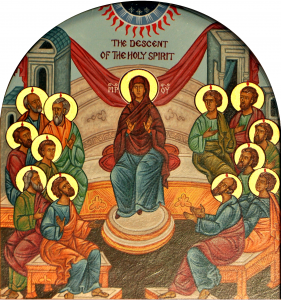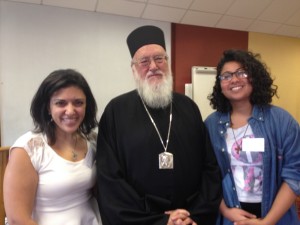This is a brief excerpt from a lecture by great theologian and scholar of the Orthodox Church, His Eminence Metropolitan Ware (author of many books and articles, including well-known book, “The Orthodox Way”).
The lecture was delivered at the OTRF (Orthodox Theological Research Forum: https://otrf123.wordpress.com) Conference on “Inspiration through Time: Women’s Ministries in the Orthodox Church” in England on September 8th, 2014
For full audio lecture, please email me at donnamrizk@gmail.com
Below is a transcription (as said by Metropolitan Ware himself) of parts of his lecture (unless noted everything is from him).
———————————-
Are women and men treated differently in the sacramental life of the Church?
For baptism and chrismation, both males and females receive the gift of the Holy Spirit alike and are empowered to bear witness to the faith – by words and by way of life. Those who are baptised and chrismated receive the “anointing from the Holy One” (1 John 2:20).
However, when we come to baptising infants, we come across a problem. The Church of the child with the mother occurs on the 40th day (in the Eastern Orthodox Church).
Here is where the problems begin. The mother comes on the 40th day and the godparent, however, nothing is said about the attendance of the father (my emphasis added). There are the prayers for the mother – so we are bound to ask ourselves certain questions. If the service of the 40th day was simply for thanksgiving for giving birth to the child, that would be fine. But in fact, the prayers have a penitential character. It said of the mother, “purify her from all sin and defilement, wash away the defilement of her body and the corruption of her soul…” It seems to be suggested that to give birth to a child renders the mother not only unclean, but somehow sinful (my emphasis added). In the course of the service, the words of Psalm 50/1 are quoted, “..in sins my mother conceived me.” Some women refuse to go through this service because they can’t look at their child during the prayers of this service.
If the woman is unclean and sinful, what about the father? Nothing is said about him, but he is also responsible for the birth of the child. Does he not have to be cleansed and forgiven just as the mother? Isn’t there a certain imbalance? But worse is still to follow. It is clearly said in the rubrics that on the 40th day a priest is to take the male child in his arms and to bring the male child into the sanctuary behind the iconostasis. If it is a female child, she is brought before the holy doors (door of the sanctuary), and not taken into the sanctuary. Why is this distinction made?
There is a misunderstanding of the canons: “no one” – man or woman can enter the sanctuary unless they are ordained. But men who are not ordained freely enter the sanctuary, and women are excluded. This exception only occurs in women monasteries when women can enter and help in the altar.
Doesn’t this service have to be looked at again? There are questionable elements. These must be presented to the holy council that will be held in 2016. (For the Eastern Orthodox Church)
For the mystery of confession, there is the practice of spiritual mothers, and in some cases also of lay people besides nuns. Women of course cannot practice sacramental absolution as they are not part of the priesthood.
For the Eucharist – there are rules which are applied in many places but not in all, where many forbid women to take communion during their cycle. The rules are early; they go back to the third century – but it was a debate in the Early Church. The Church of the New Testament does not continue the Jewish idea of “ritual purity” – only what we have in the Christian Church is moral purity. Ritual purity should not be applied in the Church.(my emphasis)
I do not consider that this rule should be applied; preparation is spiritual, not physical, but we should be aware that this rule is still being followed.
This also applies to men. When he has an emission then he should not go to communion, but this is not usually applied.
In Judaism, ritual purity prevails, does it have any place in Christianity? We must only accept moral purity.
The Sacrament of Marriage: there are 2 tendencies. Firstly, some ceremonies emphasise the equality of man and woman. The blessing of crowns and the rings – both sides are treated as equal along with the prayers; they are both blessed in just the same way.
In common practice there may be differences, such as the rings may be different – for customs, the service books says nothing. But the subordination of woman to man is said – but it is scriptural, “… may her hand be subject to her husband…but the husband be the head of the wife so that they may live according to Thy will…” (Eastern Orthodox Marriage Prayer)
For Ordination: in the Ancient Church we have deaconesses.. this has fallen into misuse. Many Orthodox Churches have revived this role in the past 50 years but nothing concretely has happened.
St. Nectarios of Pentapolis mentions that there are deaconesses in the West – the deaconesses are not considered to be an equal rank with that of deacons – the deaconesses were a functional office. But in the East, the service prayers of ordination of deaconesses is identical with that of the deacon (my emphasis). She is ordained during the liturgy (readers and subdeacons can be ordained outside of the liturgy). She is ordained inside the sanctuary and is given a sticharion and a stole. (my emphasis). Our church believes in rule of prayer and rule of faith (prayer reflects our faith and our faith reflects our prayers). If the deaconesses are ordained the same way – should they not be sacramentally be equal [to the deacons]?
So why isn’t the role revived? When adult baptisms died out in the Church, the role of deaconesses also died. But if we revive the order it doesn’t have to be the same as the early church – we can rethink of it for now.
Anointing of the Sick: There is no difference between men and women.



 I'm an ever-learning student, who wishes to share what I've experienced and been taught throughout the years -- whether through personal experience and/or my academia in theology. I hope to inspire others to learn more about life, God, and for each one to find their desired purpose and calling in this world.
I'm an ever-learning student, who wishes to share what I've experienced and been taught throughout the years -- whether through personal experience and/or my academia in theology. I hope to inspire others to learn more about life, God, and for each one to find their desired purpose and calling in this world.
Is that you and Bishop Kallistos?? So lucky!! Thanks for sharing this excerpt. I wish I could read/hear the whole thing. That’s awesome that you got to attend this conference.
I feel like our church still retains all these rituals simply because we really want to have meaning and rituals for these things. I think it would be good to rewrite the prayers and making our own Christian rituals. It would be an awesome idea for example, to have a prayer for the father as well.
Amen Martha! I think they do need a review — in light of our Orthodox theology — or at least explain such prayers that cause confusion to the people…as we say often (and Fr Alexander Schmemann) “rule of prayer is rule of faith” ..so if our prayers reflect our faith..we need to explain such statements for more understanding and edification